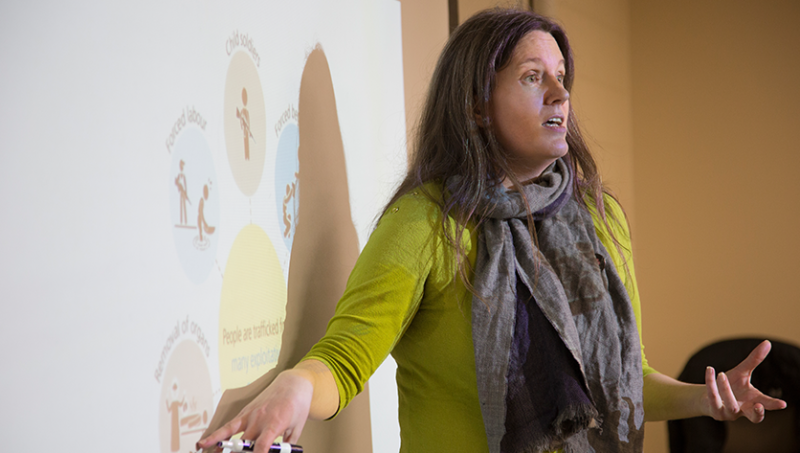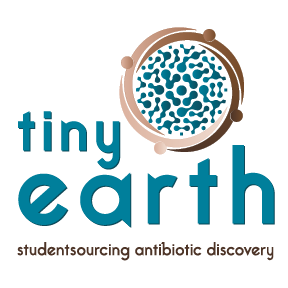
Tiny Earth Partner Instructor (TEPI), Dr. Jennifer (Jenn) Kerr, was selected for the Leading Women Under 40 Award, recognizing her excellent contributions to teaching and research. The award honors women under 40 based on their professional experience, community involvement, and commitment to inspiring change. The celebrated honorees are selected by a panel of judges including previous Leading Women and The Daily Record.
Dr. Jenn Kerr is an associate professor of Biology at Notre Dame of Maryland University with particular interests and notable works in microbiology, dental research, and antibiotic discovery. Dr. Kerr is also a Pre-pharmacy coordinator at NDMU, a 2021-23 High-throughput Discovery Science & Inquiry-based Case Studies for Today’s Students (HITS) Fellow, a member of her department’s antiracism committee, President of the American Society for Microbiology’s Maryland Branch, and co-author of several publications including “AJEDI in Science: Leveraging Instructor Communities to Create Antiracist Curricula.” The recent article, with co-authors Sarah Miller (Tiny Earth Executive Director) and Dr. Jo Handelsman (Tiny Earth Founder), focuses on collectively breaking barriers for underrepresented students in STEM by leveraging instructor communities of practice to build, adapt, and integrate antiracist and inclusive teaching.
Trained as a TEPI in 2016 at the University of Connecticut, Dr. Kerr brought the Tiny Earth Course-Based Undergraduate Research Experience (CURE) to Notre Dame of Maryland University with a passion for accessible science education. Since then, she has mentored over 200 students in engaging in antibiotic discovery through hypothesis-driven research. Dr. Kerr has anchored her innovative approaches to teaching and conducting research with a powerful dedication to diversity and inclusion in academia to help lead Tiny Earth in transforming AJEDI (anti-racism, justice, equity, diversity, and inclusion) principles into action.
“I love Tiny Earth because my students have always been interested in microbiology—it’s fascinating. But through the concept of being able to do original research and developing original ideas while building projecting ownership and relevant connections to their future careers… I’ve seen a change in willingness to learn and a shift in engagement now more than ever.”
Of her impactful leadership experiences in Tiny Earth—from leading workshops to serving on the Tiny Earth Pivot to Online Curriculum Committee—Dr. Kerr cites being able to immerse in and implement AJEDI-focused research in science, curriculum, and instruction as the most valuable. In her work, she has highlighted examples to actively engage AJEDI principles in classrooms with applicable and specific action—not only providing explicit models for instructors to use in Tiny Earth courses but also holistically fostering inclusivity and accessibility in STEM education.
The heavy lifting began in 2020 when Dr. Kerr joined the Tiny Earth Curriculum committee to develop AJEDI applications in STEM. Since then she says she has learned many new perspectives and practices, which continue to evolve. In the past 2 years, there has been a notable push to be more meaningful and willingness to address AJEDI principles within the Biology department at NDMU. There is still some denial about the presence of structural racism in the study design and research of science, because the field is considered exacting and measurable. Highlighting areas of need, connecting and disseminating established and assessed ideas, while uplifting and creating communities of practices, Dr. Kerr says, is all a part of the process. “There is a renewed effort, but there’s also a long way to go.” The list of goals and objectives is huge, but setting a steady pace is necessary. “We’re striving for balance—taking it ‘slow’ and ensuring a level of confidence and intention when we roll out tools, resources, [and initiatives]…so that we can hear diverse perspectives and voices without being performative.”
Adopting and incorporating AJEDI principles into science curriculum or even department-wide initiatives is a dynamic and continuous process. “It’s not something you can add to a program and be done with. You have to review and assess this type of work every year, semester, and even every week” to establish and follow through on comprehensive and intentional objectives towards change. Getting that message across has helped people gain new perspectives and recognize the undertaking as a community. Despite the tremendous effort, research, and advocacy she’s done, Kerr insists she’s not an expert, but rather a resource who’s passionate in helping other instructors promote inclusivity by providing the necessary information and steps to challenge and rebuild structural and systemic inequity in education.
“Through a CURE (Course-based Undergraduate Research Experience), undergrads have the opportunity to do meaningful research. That’s the spirit we need to instill in students—that they have the power to conduct scientific research and have a hand in their careers.”
To instructors who are interested in getting involved in AJEDI curriculum development and implementation, Kerr emphasizes the importance of collective power. “In teaching you have a lot of autonomy and ability to create things and teach things your own way, but sometimes the real benefit is having someone there to help you and share ideas.” Part of the work is recognizing that you don’t have to do it all by yourself, and there is tremendous reward in connecting with one another through troubleshooting, trial and error, and collaboration. “We’re a community… It’s about working together and making it the best place for students to learn,” says Kerr.
Thank you to Dr. Jenn Kerr for her wonderful and impactful contributions to Tiny Earth and STEM education, and congratulations on receiving the Leading Women award!
Written by Trang Tran (she/her), Tiny Earth Outreach Specialist

